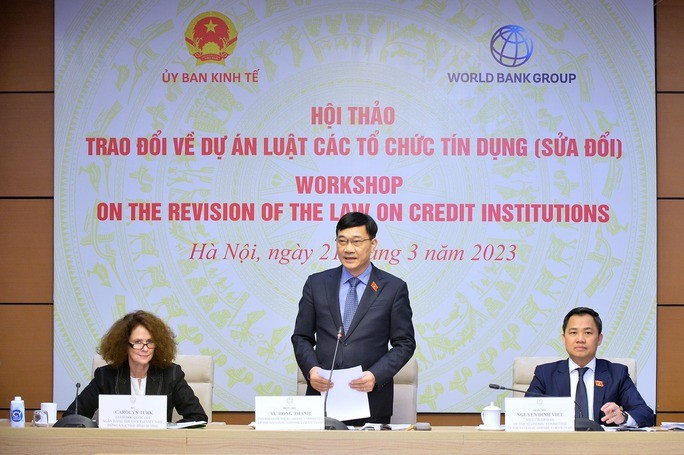The seminar discussed the proposed Law on Credit Institutions on March 21 recognized that in the process of restructuring credit institutions, the Law on Credit Institutions continued to reveal a number of limitations.
In particular, the current legal system of Vietnam has not met the requirements of effective banking recovery and settlement. The Law on Credit Institutions still lacks a clear set of objectives on banking settlement, and does not specify sufficient legal authority in this regard. In addition, the Law on the State Bank is incomplete, lacks provisions on the necessary authority and safeguards in emergency liquidity support or in appointing the State Bank as the settlement agency.
According to the World Bank’s Country Director for Vietnam Carolyn Turk noted when amending the Law on Credit Institutions, it is necessary to pay attention to include the best practices and international standards. She suggested Chairman of the Economic Committee Vu Hong Thanh that the current Law on Credit Institutions needs better regulate risk monitoring mechanism and risk supervision to financial corporations.
 |
| The World Bank’s Country Director for Vietnam Carolyn Turk at the seminar (Photo: Le Binh). |
Banks need effective framework for dealing with financial stress or failure
Senior Supervisor of the World Bank Geof Mortlock warned that financial system stress can spread quickly, which can quickly lead to bankruptcy. In the case that financial system stress occurs in one bank, deposit withdrawals take place very quickly, possibly causing the bankruptcy of one or more banks. Geof Mortlock recommended that banks in a state of financial stress should have thorough plans to restore financial stability.
An effective framework for dealing with stress or bank failure requires the following elements: early intervention; bank recovery plans; policies, powers and plans for banking settlement; source of support for settlement; emergency liquidity support for solvency banks. At the same time, supervisors need effective early intervention to assist banks in financial stress with
In particular, the resolution of banks requires careful planning, the resolution agency needs to prepare comprehensive settlement plans for all major banks, the aim is to minimize the impact on the overall finance stability, to reduce costs for the government, and to avoid destabilizing depositors and other lenders. These plans need to be checked regularly.
The seminar concluded that the amendment of the Law on Credit Institutions is necessary for Vietnam to effectively deal with stress and bank bankruptcy. The State Bank of Vietnam needs to strengthen policies and procedures for early intervention, bank recovery and settlement, and at the same time, it needs to strengthen policies and procedures to support emergency liquidity.
The key factors for central banks to effectively exercise their powers are operational independence, accountability, resources and legal protection for supervisors. The State Bank should make good use of its operational independence in the exercise of its jurisdiction.
Professor Andrew Godwin, World Bank Advisor, said that the goal of the law amendment is to define powers to enhance the effectiveness, efficiency, accountability and transparency of regulatory agencies, including central bank, maintaining the stability of the financial system, protecting depositors within the deposit insurance and depositor priority mechanism, minimizing public financial risks.
 |
| The host of the seminar, chairman of the Economic Committee Vu Hong Thanh (Photo: NLD). |
In response, Chairman of the Economic Committee Vu Hong Thanh reaffirmed that the amendment of the law will be carried out thoroughly in the context of the overall Vietnamese law. The resolution agency will review relevant laws such as the Law on Deposit Insurance, the Law on the State Bank, focusing on priorities in law application, design of warning systems and mechanisms, and early handling of market fluctuations.



